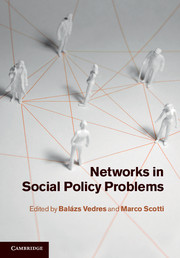Book contents
- Frontmatter
- Contents
- List of contributors
- Acknowledgements
- 1 Introduction
- Part I Information, collaboration, innovation: the creative power of networks
- Part II Influence, capture, corruption: networks perspectives on policy institutions
- Part III Crisis, extinction, world system change: network dynamics on a large scale
- References
- Index
1 - Introduction
Published online by Cambridge University Press: 05 September 2012
- Frontmatter
- Contents
- List of contributors
- Acknowledgements
- 1 Introduction
- Part I Information, collaboration, innovation: the creative power of networks
- Part II Influence, capture, corruption: networks perspectives on policy institutions
- Part III Crisis, extinction, world system change: network dynamics on a large scale
- References
- Index
Summary
Introduction: applied network science
This volume provides an overview of network science applied to social policy problems. Network science is arguably the most dynamic and interdisciplinary field that has grown up to address problems of an increasingly interconnected world. Social problems transgress disciplinary boundaries, especially with the ever-increasing complexity of our globally interconnected world society. It is natural that with complex problems such as loss in ecological diversity, economic crisis, spread of epidemics, and the safety of our food supply, we turn to a field of research that focuses on explaining complex dynamics, and that is inherently interdisciplinary itself.
Networks have become part of our everyday experience as we routinely use online social network services, we hear reports on the operations of terrorist networks, and we speculate on the six degrees of separation to celebrities and presidents. Less manifestly, we rely on vast and complex infrastructural networks of electric power distribution, Internet data routing, or financial transfers. We only ponder the complexity of these systems when we are faced with avalanche-like dynamics in their collapse, as major blackouts, system stoppages, or financial meltdowns.
With networks on the collective mind, there is ample interest in tools to understand and manage complex network systems of social ties. At the time of writing this introduction (in October 2011), there were eighteen applications available on Facebook to visualize one's social network. The popularity of such software tools shows our fascination with the interesting new perspective that the graphic visualization of friendship ties provides.
Information
- Type
- Chapter
- Information
- Networks in Social Policy Problems , pp. 1 - 12Publisher: Cambridge University PressPrint publication year: 2012
